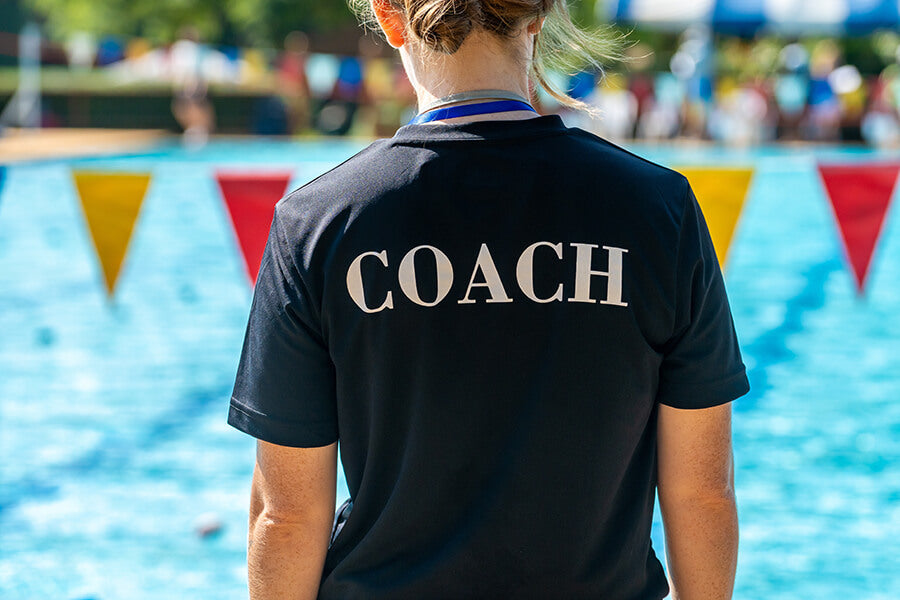10 Tips for Swim Coaches
Swim coaches play a crucial role in shaping not only swimmers' athletic performance but also their personal development. Whether you're coaching beginners in a local league or training athletes for high-level competition, these tips can help ensure you create a positive, motivating, and effective environment for swimmers at all stages.

1. Focus on Fundamentals
Every swimmer, no matter their skill level, benefits from mastering the fundamentals. Emphasize proper technique for each stroke—freestyle, backstroke, breaststroke, and butterfly. The foundation built on good form not only prevents injury but also improves efficiency and speed over time. Coaches should reinforce the basics regularly, even for advanced swimmers, to ensure longevity and success in the sport.
2. Set Achievable Goals
Swimming is a sport of progression, and it’s important for swimmers to set and work toward achievable goals. As a coach, you can help them develop short-term goals like mastering a particular stroke or improving a lap time, as well as long-term goals such as qualifying for a particular event. Helping swimmers recognize progress, no matter how small, keeps them motivated and focused.
3. Build Confidence through Positive Reinforcement
Positive reinforcement is essential to building confidence, particularly in younger swimmers. Recognize and praise improvements, whether it’s achieving a new personal best or showing perseverance during practice. Swimmers thrive in an environment where they feel supported and encouraged. Constructive feedback paired with positive reinforcement ensures athletes stay motivated, even when facing challenges.
4. Emphasize Teamwork and Sportsmanship
While swimming is often seen as an individual sport, the value of teamwork should not be underestimated. Swim relays and team meets foster collaboration, communication, and a sense of camaraderie among swimmers. Coaches should instill the importance of good sportsmanship and teamwork, whether swimmers win or lose. This not only builds a positive team dynamic but also helps swimmers develop essential life skills.
5. Be Adaptable to Different Skill Levels
Coaches often manage swimmers with a wide range of abilities and experience. Tailor your approach to meet the needs of each swimmer. For beginners, focus on patience and building foundational skills, while for more advanced swimmers, introduce challenging drills and personalized feedback to fine-tune their techniques. A one-size-fits-all approach doesn’t work in coaching, so flexibility is key.
6. Encourage Consistency in Practice
Success in swimming is often the result of consistent practice. Encourage swimmers to attend practices regularly and stay committed to their training schedules. Help them develop a routine that balances swimming with other life commitments, especially for young swimmers who may be juggling school, extracurricular activities, and social life. Consistency builds endurance, improves technique, and fosters a long-term love for the sport.
7. Foster Mental Toughness
Swimming requires both physical and mental strength. A good swim coach not only prepares athletes for the physical demands of the sport but also helps them build mental resilience. Teach swimmers how to stay focused under pressure, deal with setbacks, and push through challenging moments. Visualization techniques, goal-setting, and mindfulness practices can all play a role in helping athletes stay mentally tough.
8. Maintain Open Communication with Parents
For younger swimmers, parents play an important role in their overall swimming experience. As a coach, maintaining open communication with parents can help set expectations and ensure everyone is aligned on goals, schedules, and any challenges a swimmer might be facing. Keeping parents informed about their child’s progress, upcoming events, and areas for improvement fosters a collaborative approach to the athlete’s development.
9. Stay Updated on Coaching Techniques
Like any other sport, swimming is constantly evolving, and as a coach, it’s important to stay updated on the latest techniques, training methods, and rules. Attend coaching clinics, workshops, and seminars to keep your knowledge current. This not only benefits your swimmers but also strengthens your coaching abilities and keeps your training sessions fresh and effective.
10. Prioritize Fun and Enjoyment
Swimming is a demanding sport, but it should always be enjoyable. Coaches should create an environment where swimmers of all ages and skill levels feel the joy of swimming. Keep practices engaging with fun drills, team-building exercises, and encouraging a healthy competitive spirit. When swimmers enjoy the process, they’re more likely to stick with the sport and grow as athletes.
Making a Difference in Kids' Lives
Swim coaches have a unique opportunity to positively impact the lives of young swimmers beyond the pool. Coaches often become role models, guiding kids in important life skills such as discipline, time management, and perseverance. By teaching swimmers how to set goals, handle success and failure, and work as part of a team, coaches influence their personal development.
Young swimmers learn valuable lessons about handling pressure and overcoming challenges, which are directly transferable to their academic and social lives. A coach who prioritizes communication, offers support during tough times, and celebrates small victories helps build a swimmer’s confidence both in and out of the pool.
For many kids, swim team becomes a source of friendship, support, and personal growth. Coaches foster an environment that allows children to thrive socially, emotionally, and physically. The confidence built in the water often translates to greater self-esteem and resilience in other areas of life.
We can help you succeed as a swim coach
Whether you’re coaching at the beginner level or training elite athletes, these tips can help you create a positive, successful swim program. By focusing on fundamentals, encouraging consistency, and fostering a supportive environment, swim coaches make a lasting impact on their swimmers’ lives. If you’re looking for quality swim gear and accessories to help your team perform at their best, visit Reddiset Swim Shop for a wide selection of swimwear, training tools, and more. Equip your team with everything they need to succeed in the pool!

